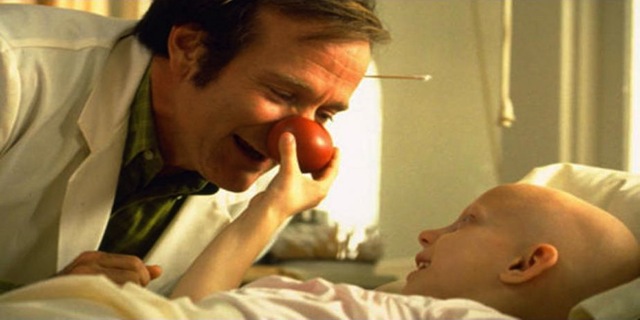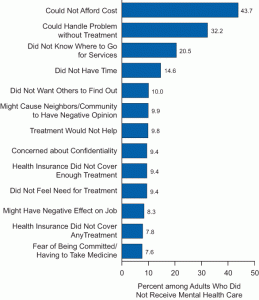Losing The Man Who Helped Us Laugh
The news that beloved actor and comedian Robin Williams killed himself should jar us from complacently accepting the status quo of mental healthcare in the US. His suicide also exposes the stigma of mental illness. In 2006, during an interview on “Fresh Air,” Williams’ responded to Terry Gross’ question about his struggles with addiction and mental illness this way:
“I volunteered to be on the cover of a — I think it was Newsweek, for their issue on medication. … And when
the guy said, “Well, do you ever get depressed?” I said, “Yeah, sometimes I get sad.” I mean, you can’t watch news for more than three seconds and go, “Oh, this is depressing.”
And then immediately, all of a sudden, they branded me manic-depressive. I was like, “Um, that’s clinical? I’m not that.” Do I perform sometimes in a manic style? Yes. Am I manic all the time? No. Do I get sad? Oh, yeah. Does it hit me hard? Oh, yeah.” ~Robin Williams
After his suicide by hanging, this statement is poignant, disturbing and terrifying. What can be done to prevent others from Williams’ fate?
![]()
Increase Awareness that The Brain is An Organ Like Other Organs
Brains are organs, like stomachs and hearts. The brain gets sick the way other organs of the body get sick. Illness of the brain is not “made up” nor is it caused by “wrong thinking.” In fact, the brain can even be affected by the flu. Mild depression and anxiety are a common response after illnesses like the flu.
 Research
Research
Research on brain illness is in its infancy, but there are innovative efforts to increase funding. The Staglin family has been instrumental in starting initiatives for funding such research.
The International Mental Health Research Organization IMHRO and One Mind are two of their initiatives to increase funding.
 Access to Medications and Treatment
Access to Medications and Treatment
Often cost and insurance coverage interfere with people obtaining the care that they need. The hope is that the Affordable Care Act will lessen this barrier to care. However, for people with treatment resistant depression or other resistant illnesses, new treatments are needed. Additionally, a new incentive must be implemented to encourage pharmaceutical companies to produce medications that may not be profitable but are in fact needed.
According to 2010 government statistics 60 percent of Americans with mental illness did not get treatment during the preceding year. The reasons that were stated included concerns about being able to pay for it, uncertainty as to where they should find treatment and concern that others would find out about getting treatment.
Reasons why people didn’t receive recommended mental health care, 2010. Source: HHS
 Understanding
Understanding
For people with other chronic illnesses, depression may creep up without warning. As Marie Ennis-O’Connor eloquently states,
“Like cancer, depression is a complicated illness and not easily labelled; not that this fact will stop people who have no experience of the illness making ill-informed and misguided comments. There is still a lot of misunderstanding about the nature of depression as evidenced by those commentators who express surprise that someone who “had it all” would throw it all away. The English actor Stephen Fry, himself no stranger to depression, has spoken about how it isn’t a straightforward response to a bad situation: “depression just is, like the weather”.
Depression arrives like a stealth bomber out of the blue for many cancer survivors – unexpected feelings of depression and loneliness can surprise us after treatment is finished. Cancer survivor Lara Huffman captures this so well on her latest blog:
“Depression hit me after cancer treatment, which caught me by surprise. I had never experienced depression before. For a long time, I kept thinking I could will myself out of the despair I felt. I couldn’t understand why I felt the way I did after treatment, like I just went through hell, so why couldn’t I escape it?”
End the Stigma
There are thousands of amazing individuals “living lives of quiet desperation.” According to the National Institute of Mental Health, 90%+ of those who die by suicide have a diagnosable mental illness. One out of five people are dealing with a mental illness in any given year… this means that EVERYBODY KNOWS SOMEBODY who is living with a mental illness!
Of the 20% living with a mental illness, many have not received any treatment largely due to the stigma.
Perhaps it is not correct to speculate on Williams’ decision to kill himself, but he did make that decision, and took the step that would arguably never be taken by someone in his right mind.
Was he in denial about having mental illness? Again, it is not correct to speculate. However, we do know that the stigma surrounding any discussion of mental health leads to people denying and hiding their experience. This is wrong! Sadly, the world has lost yet another wonderful, glowing life, someone who brought happiness to many.







Thanks for sharing my thoughts on this topic.One of the most common things you feel when you are depressed is that you are completely alone, isolated by your feelings, that no one could possibly understand how you feel because you barely understand it yourself. Since opening up about my own experience of depression on this blog, I’ve found that more people than you can imagine have experienced depression at one time or another in their lives. People are often relieved when you admit to it as it gives them the courage to do the same. It is so important that we keep speaking out on this topic. Our silence will not protect us or others who suffer.
Marie, You are brave, courageous and correct. Silence only continues the suffering and protects no one. Thank you for your comment and your invaluable insights on this and so many other important health and communication topics. You are indeed a treasure!
Thank you for sharing these thoughts–acting on our grief to change our world for the better is the healthiest response. In addition to enabling cutting-edge research and collaboration, we are still working to implement brain disease prevention throughout the nation. Last night, a new partner in my family’s effort to implement prevention programs, Susan Stilwell organized a dinner called AIM for Mental Health which raised more than $200K toward starting a new prevention center in the Monterey area. Bravo. Early intervention was key in my recovery–it works.
Brandon, I am honored and humbled that you have taken time out of your work to comment on this blog post. Thank you so much for all that you and your family are doing to change the conversation and move research forward. We need to bring awareness to the organizations you and your family have started to help change the conversation around mental health, mental illness and the brain. Thank you also for bringing Susan Stilwell to my attention. I will look for her work and be sure to do all I can to promote these innovative efforts. There is so much suffering across this country caused by the stigma around brain health and illness and it is vital that we work diligently. Thank you for all that you do.
Marie said, “Our silence will not protect us or others who suffer.” That’s such an important message. Thanks to both of you for sharing your thoughts and voices. We need everyone.
Warmly,
Ann
Thank you Ann for being such a powerful voice in this conversation! Let’s keep up this work!
If our brains are not healthy, how can they possibly orchestrate the necessary steps and care to ensure our bodies are healthy? Having watched my brother die from the ravages of cancer that wasn’t seen, let alone diagnosed until Stage IV, now I advocate the importance of brain health, not “mental illness.” Who is to say his death wasn’t actually suicide by unavoidable neglect? We must put brain health as the first priority, from childhood onward.